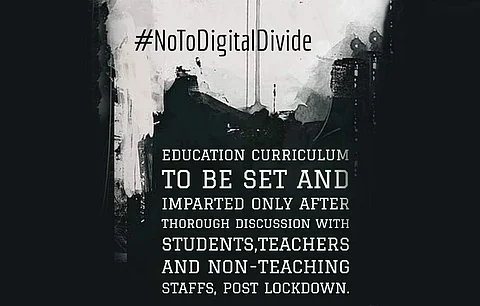

Students and teachers across India have been against the move to go digital with examinations as internet connectivity issues would not let students from remote areas and underprivileged sections of society be a part of the process. The protest though had to be entirely digital because of the regulations that are in place during the lockdown. The hashtag #NoToDigitalDivide was trending on Twitter along with #GiveUsOurFellowships and issues specific to Delhi University with the hashtags #DUwithSolutions and #DUAgainstOnlineExams.
Several students' organisations including All India Students' Association (AISA), Students' Federation of India (SF), Democratic Students Union (DSU) and Pinjra Tod participated in the Twitter protest. "Why doesn’t the Rs 20 lakh crore package allocate any funds for expansion of internet connectivity around the country to facilitate online classes and online exams? Why doesn’t the package include an immediate rent waiver for students living in rented accommodation or a fee waiver for schools, colleges and universities — both private and government sectors?" asked Sai Balaji, National President AISA. "The alternative is offline mode. Each department has to come up with new methods to ensure evaluation. For that, there has to be a coordinated approach. This isn't happening. How many university administrations are coordinating with teachers and students? I think none," he added.
Over the last decades, the percentage of women, Dalit, Adivasi, OBC, Muslim and disabled students in higher education has seen a considerable increase, transforming and democratising the space of public universities, said the women leading the Pinjra Tod movement. The push for online modes of learning and exams on the pretext of responding to the COVID-19 pandemic, while implementing budgetary cuts on allocations for e-learning is the last nail in the coffin aimed at completely destroying the minimal access to higher education that marginalised students had managed to achieve after a long history of struggle," said a statement. "In a country where electricity connectivity is erratic in most places, particularly rural areas, where only 24 per cent own smartphones or have internet connectivity, where only 8 per cent homes with young members have a computer with internet, where there is a huge gender divide in internet access — any move towards digital education is highly exclusionary and reverts many hard-earned gains that had made access to higher education possible for the marginalised," it further added.
The students observed a Student-Youth Joint National Protest Day and did not limit themselves to online protests and displayed black flags on housetops, wore black bands, along with posters, poetry, and placards and clicked photos which were then shared online. They also turned their profile pictures of Facebook, Twitter, Instagram black and uploaded photos of placards and the Black Flag Campaign as posts asking the Prime Minister the questions they had in mind. "We must resist all attempts of the university to adopt an exclusionary model of online exams," said one of the women activists. "For a large central university like Delhi University, which also includes School of Open Learning (SOL) and Non-Collegiate Women's Education Board (NCWEB) and which has students from diverse backgrounds from all across the country, online exams means that a vast majority of students are going to be automatically excluded and will have to undergo tremendous difficulties," she added.
The hashtag protest, the students say was a part nationwide protest against the "anti-student" policies of the government. "This approach of online evaluation is insensitive and unjust and to ensure that only privileged are able to take these exams," said Parichay Yadav, a member of the SFI Pondicherry Unit and the president of the Pondicherry University Students' Council. "The 20 lakh crore economic package does not have anything for students and youth. The Finance Minister or the Prime Minister has not uttered a single word on issues concerning students," added Balaji.
The students asked why all pending fellowships of research scholars and other students till May 2020 have not been released yet? "There is no holistic plan to cater to the needs of students with disabilities to continue their education smoothly. Neither is there a Universal Basic Income plan to assist the unemployed students, migrant workers and other citizens, and generate the purchasing power required to reboot the economy," added a statement by the AISA. "The government also does not have Universal Rations to be made available to students based on college, university or educational institute ID card. There is no Immediate moratorium on repayment of the educational loans for at least six months with interest waiver on all education loans either. Why are the youth of our country left unemployed, and forced to die walking back home on highways? Why no transport for workers? Why no survival package for them in the face of widespread joblessness and destitution?" asked the students.
